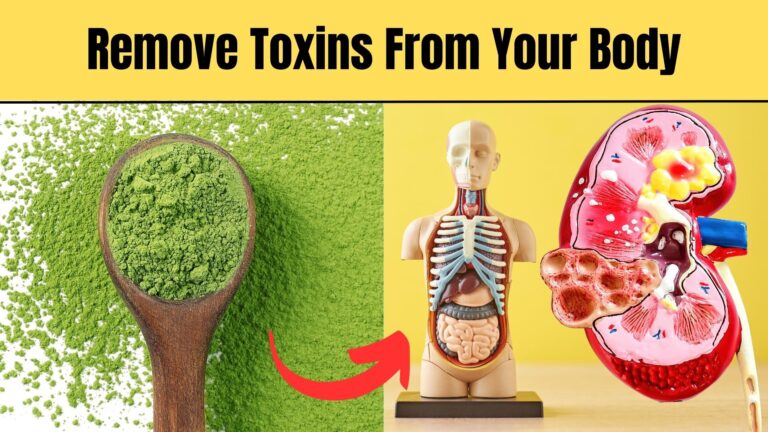In our modern lifestyle, we are exposed to various pollutants and harmful substances that can accumulate in our bodies over time. Detoxifying the body is crucial for maintaining optimal health. One effective way to achieve this is by incorporating specific foods into your diet. In this comprehensive guide, we will explore the best foods that help remove toxins from your body, providing you with practical insights on how to enhance your overall well-being.
Cruciferous Vegetables: Powerhouse Detoxifiers
Cruciferous vegetables such as broccoli, cauliflower, kale, and Brussels sprouts contain compounds like glucosinolates that support the liver’s detoxification processes. These vegetables enhance the production of enzymes responsible for breaking down and eliminating toxins from the body.
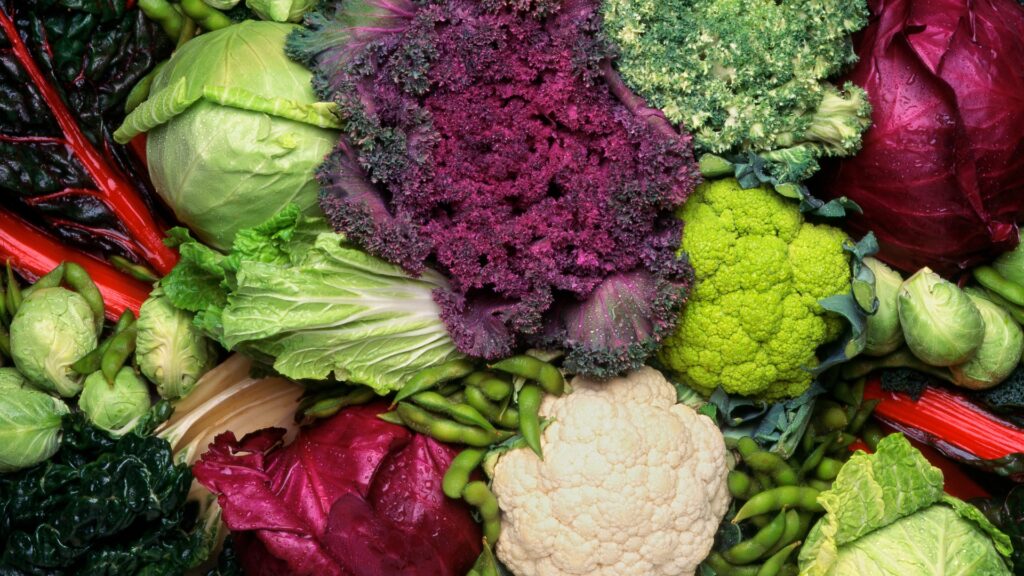
It’s crucial to highlight how these nutrient-rich greens play a pivotal role in supporting the intricate detoxification processes within the liver.
1. Glucosinolates and Detoxification Enzymes:
At the heart of cruciferous vegetables’ detoxifying prowess are glucosinolates, sulfur-containing compounds that impart a distinct taste to these greens. When these vegetables are ingested, glucosinolates are broken down into bioactive compounds through processes like chewing and chopping. This breakdown results in the formation of powerful substances, including sulforaphane, indole-3-carbinol, and others, each contributing uniquely to the detoxification journey.
2. Liver Support and Phase I Detoxification:
Cruciferous vegetables actively support the liver, the body’s primary organ for detoxification. The liver’s Phase I detoxification involves the conversion of fat-soluble toxins into intermediate metabolites. Here, the compounds derived from glucosinolates play a critical role in enhancing the activity of enzymes such as cytochrome P450, crucial for breaking down these toxins into manageable forms.
3. Phase II Detoxification and Elimination:
Moving into Phase II of the detoxification process, these vegetables facilitate the conjugation of Phase I metabolites. This phase involves attaching molecules to the intermediate forms, making them water-soluble and easier for the body to eliminate. Cruciferous vegetables contribute to this step by promoting the activity of enzymes responsible for the effective elimination of these water-soluble toxins.
4. Sulforaphane’s Antioxidant Defense:
Among the bioactive compounds derived from glucosinolates, sulforaphane stands out for its potent antioxidant properties. This compound activates the Nrf2 pathway, prompting cells to produce a cascade of antioxidant proteins. This antioxidant defense system plays a crucial role in protecting cells from oxidative stress, a common consequence of toxin exposure.
5. Cellular Detoxification and Regeneration:
Cruciferous vegetables go beyond aiding in the elimination of toxins; they actively contribute to cellular detoxification and regeneration. By supporting the production of glutathione, a master antioxidant, these vegetables enhance the cellular defense mechanisms against oxidative damage. This not only facilitates the removal of harmful substances but also promotes the overall health and resilience of cells.
6. Incorporating Cruciferous Vegetables into Your Diet:
To maximize the detoxifying benefits of cruciferous vegetables, incorporating them into your regular diet is key. Simple yet delicious recipes such as roasted broccoli, cauliflower rice, or kale salads can be delightful ways to make these greens a consistent part of your meals. Experimenting with various cooking methods ensures not only culinary diversity but also the retention of the essential nutrients that contribute to detoxification.
Citrus Fruits: Vitamin C Boost for Detox
Citrus fruits like lemons, oranges, and grapefruits are rich in vitamin C, a powerful antioxidant that supports the liver and aids in flushing out toxins. Consuming these fruits helps stimulate the production of glutathione, a key antioxidant that plays a vital role in detoxification.

As we delve into the realm of detoxification, the spotlight turns to citrus fruits—nature’s vibrant and zesty allies in promoting a healthier, toxin-free body. Lemons, oranges, grapefruits, and other citrus wonders are not only bursting with refreshing flavors but also packed with vitamin C, an essential nutrient that plays a pivotal role in supporting the liver and facilitating the elimination of toxins.
1. Vitamin C as a Powerful Antioxidant:
Citrus fruits are renowned for their high vitamin C content, a potent antioxidant that stands at the forefront of the body’s defense against oxidative stress. As toxins accumulate in the body, they often lead to the generation of free radicals—unstable molecules that can cause cellular damage. Vitamin C swoops in as a powerful antioxidant, neutralizing these free radicals and preventing oxidative damage to cells.
2. Liver Support and Detoxification:
The liver, a key player in the body’s detoxification process, benefits significantly from the presence of vitamin C. This essential nutrient enhances the liver’s ability to metabolize and eliminate toxins. Vitamin C supports the enzymatic reactions in the liver, ensuring a smooth and efficient detoxification pathway. By promoting these liver functions, citrus fruits contribute to the overall health and vitality of this crucial organ.
3. Glutathione Production Stimulation:
One of the remarkable aspects of vitamin C is its role in stimulating the production of glutathione—a master antioxidant found within the body. Glutathione plays a vital role in the detoxification process by neutralizing toxins and facilitating their elimination. Citrus fruits, with their vitamin C richness, act as catalysts for the production of glutathione, thereby enhancing the body’s natural detoxification capabilities.
4. Immune System Support:
Beyond detoxification, vitamin C is renowned for its immune-boosting properties. A robust immune system is integral to overall health and plays a crucial role in defending the body against infections and illnesses. The immune support provided by citrus fruits complements their detoxifying effects, creating a holistic approach to maintaining well-being.
5. Hydration and Detoxification:
Citrus fruits, with their high water content, contribute to hydration—an often overlooked but essential aspect of detoxification. Proper hydration supports kidney function, aiding in the efficient elimination of waste and toxins through urine. Including citrus fruits in your diet not only provides a vitamin C boost but also helps maintain adequate hydration levels for optimal detoxification.
6. Incorporating Citrus Fruits into Your Diet:
Enjoying the detoxifying benefits of citrus fruits is as simple as incorporating them into your daily diet. Squeeze fresh lemon juice over salads, start your day with a refreshing glass of orange juice, or snack on grapefruit segments. The versatility of citrus fruits makes them easy to weave into various culinary creations, ensuring a delightful and nutritious addition to your meals.
Berries: Antioxidant-Rich Detoxifiers
Berries, including blueberries, strawberries, and raspberries, are packed with antioxidants that combat oxidative stress and assist in removing toxins. The high fiber content in berries also promotes healthy digestion and elimination of waste from the body.
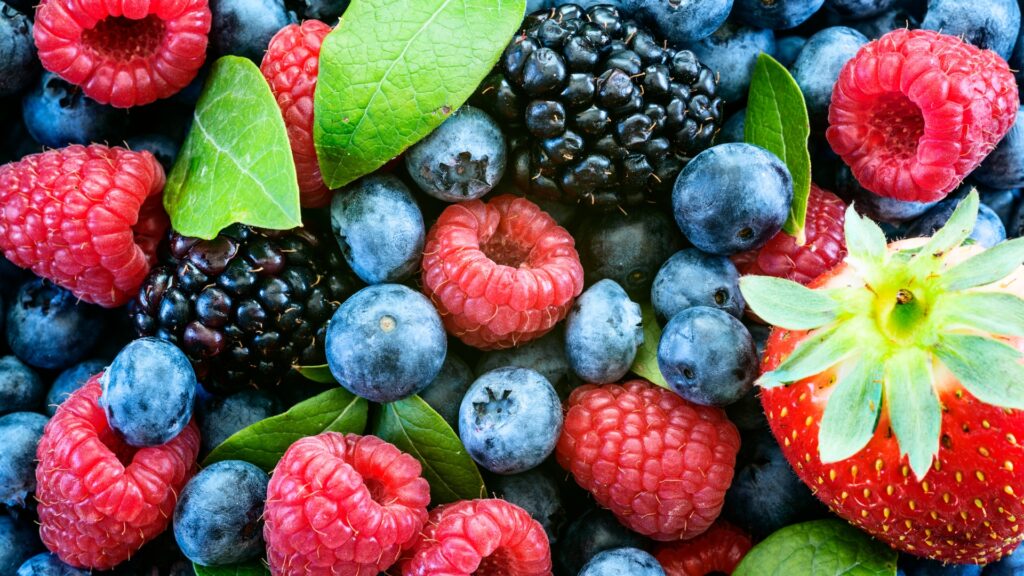
In the realm of natural detoxification, berries emerge as vibrant jewels that not only tantalize the taste buds but also offer a bounty of antioxidants essential for combating oxidative stress and supporting the body’s innate detox processes. Whether it’s the succulent blueberries, the luscious strawberries, or the tangy raspberries, these small wonders pack a powerful punch in promoting overall health.
1. Antioxidants as Detox Allies:
Berries are rich reservoirs of antioxidants, including flavonoids, polyphenols, and vitamin C. These compounds are renowned for their ability to neutralize free radicals, the byproducts of toxin metabolism that can wreak havoc on cells. By acting as scavengers for these free radicals, berries play a crucial role in reducing oxidative stress and preventing cellular damage.
2. Polyphenols and Detoxification Support:
Polyphenols, a class of antioxidants abundant in berries, contribute to the body’s detoxification mechanisms. These compounds aid in the activation of detox enzymes, particularly those involved in the liver’s Phase II detoxification. By facilitating the breakdown and elimination of toxins, polyphenols enhance the efficiency of the body’s natural cleansing processes.
3. Fiber for Digestive Health:
Berries are not only antioxidant powerhouses but also rich in dietary fiber, a key player in promoting healthy digestion. The fiber content aids in maintaining regular bowel movements, preventing constipation, and supporting the efficient elimination of waste from the body. A well-functioning digestive system is integral to the overall detoxification journey.
4. Detoxifying Vitamins:
Beyond antioxidants, berries boast an array of vitamins, including vitamin C, which contributes to the body’s detoxification arsenal. Vitamin C enhances the immune system, supports the liver in toxin metabolism, and aids in the elimination of waste. The combination of antioxidants and detoxifying vitamins positions berries as versatile allies in promoting holistic well-being.
5. Versatility in Culinary Delights:
The versatility of berries makes them easy to incorporate into various culinary delights. Add a handful to your morning yogurt, blend them into a refreshing smoothie, or simply enjoy them as a snack. Their natural sweetness and vibrant colors make berries a delightful addition to a wide range of dishes, ensuring a flavorful and nutritious boost to your diet.
6. Anti-Inflammatory Properties:
Berries also exhibit anti-inflammatory properties, further contributing to their detoxifying effects. Chronic inflammation is often associated with the accumulation of toxins in the body. By reducing inflammation, berries create an environment that supports overall health and aids in the prevention of various chronic conditions.
7. Consistent Inclusion in Your Diet:
To harness the detoxifying benefits of berries, consider making them a consistent part of your daily diet. Aim for a colorful mix of berries to maximize the variety of antioxidants and other beneficial compounds. Whether fresh or frozen, berries retain their nutritional value, offering a convenient and accessible way to infuse your meals with detoxifying goodness.
Garlic: Nature’s Detoxifier
Garlic contains sulfur compounds that activate enzymes in the liver, contributing to the detoxification process. Additionally, garlic has antimicrobial properties that support the immune system, further aiding in the removal of harmful substances from the body.
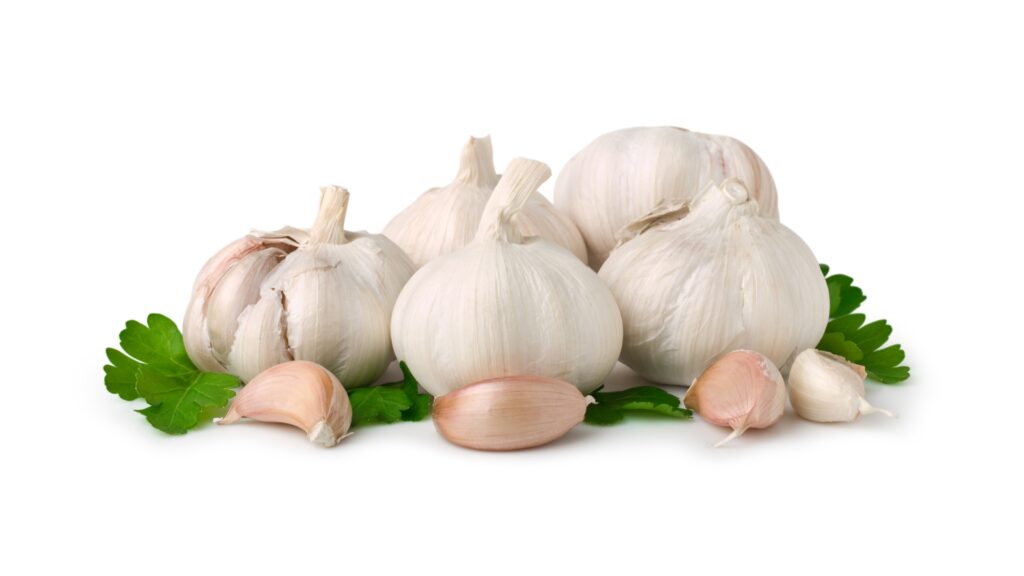
As we explore the world of natural detoxification, garlic emerges as a potent ally, not just for enhancing flavors in the kitchen, but for its remarkable ability to support the body’s detoxification processes. Packed with sulfur compounds and possessing unique antimicrobial properties, garlic stands as a natural detoxifier, contributing to overall well-being.
1. Sulfur Compounds and Liver Activation:
Garlic owes its detoxifying prowess to sulfur-containing compounds, particularly allicin. When garlic is crushed or chopped, allicin is formed, activating various enzymes in the liver. These enzymes play a crucial role in the body’s detoxification process, particularly in Phase II detoxification, where toxins are rendered water-soluble for efficient elimination.
2. Liver Support and Detoxification Efficiency:
The liver, often referred to as the body’s detox powerhouse, benefits significantly from the sulfur compounds in garlic. By activating detox enzymes, garlic enhances the efficiency of the liver in breaking down and eliminating toxins. This dual-action of garlic in supporting liver function underscores its role as a natural and effective detoxifier.
3. Antimicrobial Properties for Immune Support:
Beyond its impact on the liver, garlic possesses potent antimicrobial properties. Allicin, the star compound in garlic, exhibits antibacterial, antiviral, and antifungal effects. This unique attribute contributes to the support of the immune system, aiding the body in defending against harmful microorganisms and further facilitating the removal of potential toxins.
4. Allicin: Nature’s Protective Shield:
Allicin, formed when garlic is freshly crushed or chopped, is a dynamic compound known for its protective qualities. It not only supports detoxification but also acts as a shield against oxidative stress and inflammation. This dual functionality positions allicin as a multifaceted guardian of cellular health.
5. Incorporating Garlic into Your Diet:
Including garlic in your daily meals is a flavorful and practical way to benefit from its detoxifying properties. Whether sautéed, roasted, or consumed raw, garlic can be seamlessly integrated into a variety of dishes. From pasta sauces to stir-fries, the versatility of garlic makes it a convenient addition to your culinary repertoire.
6. Natural Detoxification and Beyond:
Garlic’s detoxification benefits extend beyond its impact on the liver and immune system. Research suggests that garlic may also assist in reducing heavy metal toxicity in the body, providing an additional layer of detox support. This broader detoxifying spectrum showcases the comprehensive nature of garlic’s contributions to overall health.
7. Caution and Considerations:
While garlic is generally safe for consumption, individuals on certain medications or those with specific medical conditions should exercise caution. Consulting with a healthcare professional can provide personalized guidance based on individual health needs.
Green Tea: Detox Elixir
Green tea is renowned for its high concentration of catechins, powerful antioxidants that support the body’s detoxification mechanisms. Regular consumption of green tea can help eliminate free radicals and promote overall health.
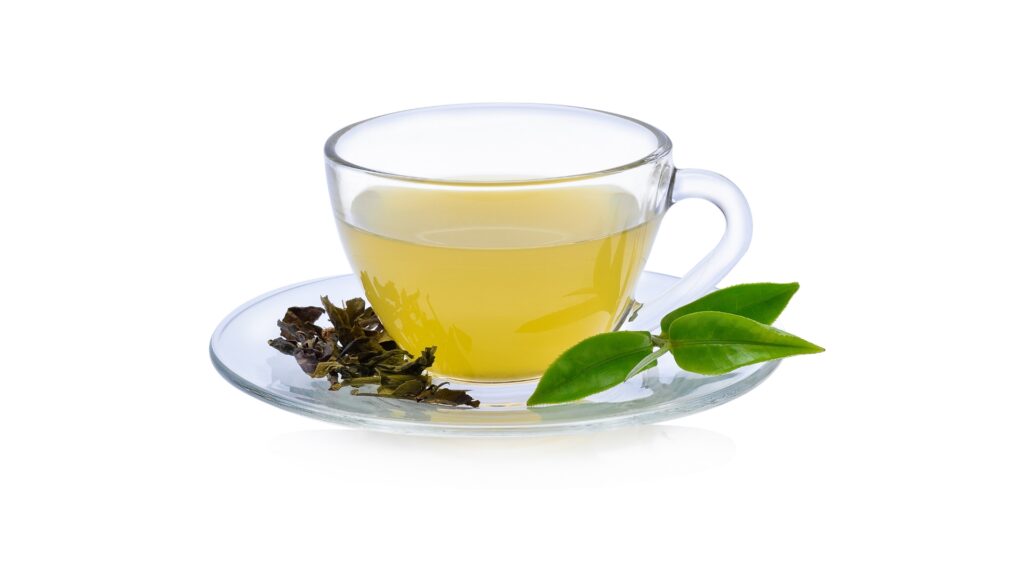
Embarking on the path of natural detoxification leads us to the world of green tea, a revered elixir celebrated not only for its soothing aroma but also for its high concentration of catechins—powerful antioxidants that elevate the body’s detoxification mechanisms. Regular consumption of green tea unveils a myriad of benefits, aiding in the elimination of free radicals and fostering overall health.
1. Catechins: The Detox Powerhouses:
Green tea owes much of its detoxifying prowess to catechins, a class of polyphenolic compounds abundant in this invigorating beverage. Epigallocatechin gallate (EGCG), the most potent catechin in green tea, stands out for its antioxidant properties, making it a key player in the body’s battle against oxidative stress and toxins.
2. Antioxidant Defense Against Free Radicals:
Free radicals, generated as byproducts of metabolic processes and exposure to environmental toxins, pose a constant threat to cellular health. The catechins in green tea act as vigilant guardians, neutralizing these free radicals and mitigating the cellular damage associated with oxidative stress. This antioxidant defense is fundamental to supporting the body’s natural detoxification pathways.
3. Liver Support and Detoxification Aid:
The liver, a central player in the body’s detoxification processes, benefits significantly from the consumption of green tea. Catechins support the liver in metabolizing toxins, enhancing the efficiency of Phase I and Phase II detoxification pathways. By aiding in the breakdown and elimination of harmful substances, green tea contributes to the overall well-being of this vital organ.
4. Cardiovascular Health Boost:
Beyond its detoxifying capabilities, green tea has been associated with promoting cardiovascular health. Regular consumption is linked to improvements in cholesterol levels, blood pressure regulation, and overall heart health. A healthy cardiovascular system is integral to supporting the efficient circulation of blood and nutrients, indirectly aiding in the body’s detoxification processes.
5. Metabolic Boost and Weight Management:
Green tea has also been linked to a boost in metabolism and weight management. The combination of catechins and caffeine in green tea can contribute to increased calorie burning and fat oxidation. Maintaining a healthy weight is a holistic approach to supporting the body’s overall well-being and detoxification.
6. Integrating Green Tea into Your Routine:
Incorporating green tea into your daily routine is a simple and enjoyable way to reap its detoxifying benefits. Whether enjoyed hot or cold, green tea can be savored as a refreshing beverage throughout the day. Aim for several cups to maximize the intake of catechins and promote a consistent antioxidant defense.
7. Varieties of Green Tea:
Exploring different varieties of green tea, such as matcha or sencha, allows for a diverse and delightful experience. Each type may offer unique flavors and varying concentrations of catechins, providing an opportunity to tailor your green tea selection to your preferences and health goals.
Turmeric: Anti-Inflammatory Detox
The active compound in turmeric, curcumin, possesses potent anti-inflammatory and antioxidant properties. Turmeric aids in reducing inflammation in the body and supporting liver function, making it an excellent addition to a detoxifying diet.
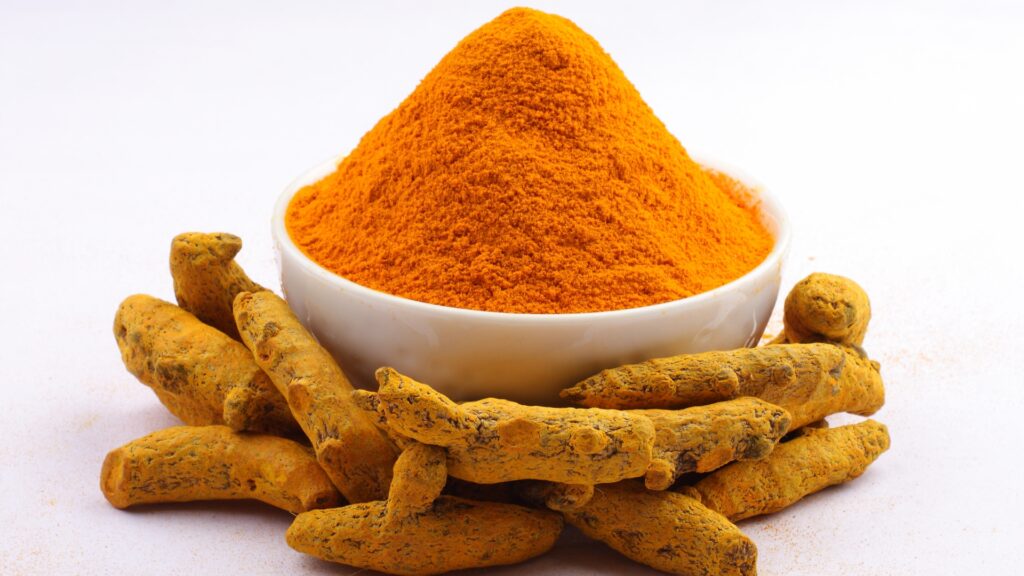
Diving into the realm of natural detoxification, turmeric emerges as a golden ally, showcasing its exceptional prowess through the active compound, curcumin. Renowned for its potent anti-inflammatory and antioxidant properties, turmeric plays a vital role in reducing inflammation within the body and supporting liver function, making it an excellent addition to any detoxifying diet.
1. Curcumin: The Potent Force Within Turmeric:
At the heart of turmeric’s detoxifying magic lies curcumin, a bioactive compound celebrated for its multifaceted health benefits. Curcumin is responsible for the distinctive golden hue of turmeric and is revered for its anti-inflammatory, antioxidant, and therapeutic properties.
2. Anti-Inflammatory Powerhouse:
Chronic inflammation is often linked to the accumulation of toxins in the body. Curcumin in turmeric acts as a natural anti-inflammatory agent, inhibiting inflammatory pathways at the molecular level. By reducing inflammation, turmeric contributes to creating an environment that supports the body’s detoxification processes.
3. Antioxidant Defense Against Free Radicals:
Curcumin’s potent antioxidant properties are instrumental in combating oxidative stress. Free radicals, generated as byproducts of metabolism or through exposure to pollutants, can cause cellular damage. Turmeric’s curcumin acts as a scavenger, neutralizing these free radicals and protecting cells from oxidative harm.
4. Liver Support and Detoxification:
The liver, a central organ in detoxification, receives significant support from turmeric. Curcumin enhances liver function by aiding in the breakdown of toxins and promoting the production of enzymes involved in detoxification processes. This dual action reinforces the liver’s role in eliminating harmful substances from the body.
5. Joint Health and Mobility:
Beyond its detoxifying attributes, turmeric’s anti-inflammatory effects extend to promoting joint health and mobility. Individuals experiencing discomfort due to inflammation may find relief through the regular incorporation of turmeric into their diet, fostering overall well-being.
6. Enhancing Bioavailability:
While curcumin offers a myriad of health benefits, its bioavailability can be limited. Pairing turmeric with black pepper, which contains piperine, can enhance the absorption of curcumin in the body. This simple combination ensures that the benefits of turmeric are maximized, making it an even more effective component of a detoxifying diet.
7. Culinary Versatility:
Turmeric’s warm, earthy flavor makes it a versatile addition to various culinary creations. From curries and soups to smoothies and teas, incorporating turmeric into your diet can be a flavorful and enjoyable experience. Experimenting with different recipes allows for a diverse and satisfying way to reap the benefits of this golden spice.
Water: The Ultimate Detox Agent
Staying hydrated is fundamental to the detoxification process. Water helps flush out toxins through urine and sweat. Adequate hydration supports kidney function, ensuring efficient elimination of waste from the body.

In the vast landscape of natural detoxification, the humble yet mighty water stands as the unsung hero, playing a fundamental role in the body’s cleansing processes. Staying adequately hydrated is not just a daily necessity; it is the cornerstone of effective detoxification. Let’s explore how water becomes the ultimate detox agent, facilitating the elimination of toxins through urine and sweat, and supporting crucial kidney function.
1. Hydration and Toxin Elimination:
The importance of water in the detoxification process lies in its ability to carry toxins out of the body. Through various metabolic processes, toxins are generated and accumulate in the bloodstream. Adequate hydration ensures that these toxins are effectively dissolved in water, allowing for their elimination through bodily fluids.
2. Efficient Kidney Function:
The kidneys, intricate filtration organs, are vital players in the body’s detoxification mechanism. Water supports the kidneys in filtering and flushing out waste products and toxins from the bloodstream. Maintaining optimal hydration levels is essential for ensuring that the kidneys can efficiently perform their detoxifying functions.
3. Urine Production and Detoxification:
The primary route through which the body expels water-soluble toxins is urine. Water ensures the dilution of these substances, allowing the kidneys to effectively filter and excrete them. Consistent hydration contributes to a robust urinary system, aiding in the continuous removal of waste products and promoting overall detoxification.
4. Sweat: A Natural Detox Mechanism:
Beyond urine, sweat serves as another avenue for detoxification. Water, through hydration, regulates body temperature and facilitates the sweating process. Sweating enables the excretion of certain toxins, including heavy metals, which can accumulate in the body. Adequate water intake supports the efficiency of this natural detox mechanism.
5. Electrolyte Balance:
Maintaining a proper balance of electrolytes, including sodium, potassium, and chloride, is crucial for cellular function and hydration. Water plays a key role in supporting this balance, ensuring that cells can function optimally and aiding in the elimination of waste from within cells.
6. Signs of Dehydration and Detox Implications:
Dehydration can impede the body’s detoxification processes. Signs such as dark urine, decreased urine output, and thirst indicate a need for increased water intake. By addressing dehydration, individuals can optimize their body’s ability to flush out toxins and promote overall well-being.
7. Individual Hydration Needs:
The optimal amount of water needed for detoxification varies among individuals based on factors such as age, activity level, and climate. Listening to the body’s signals and maintaining a regular intake of water throughout the day ensures consistent hydration, supporting the body’s ongoing detox efforts.
Frequently Asked Questions (FAQ):
How long does it take to see the effects of detoxifying foods?
The timeline varies for each individual. Consistently including detoxifying foods in your diet, combined with a healthy lifestyle, can lead to gradual improvements in energy levels, digestion, and overall health.
Are there any side effects of detoxifying foods?
In general, detoxifying foods are safe for most people when consumed as part of a balanced diet. However, individuals with specific health conditions should consult a healthcare professional before making significant dietary changes.
Can detox diets replace medical treatments for certain conditions?
Detox diets should not be considered a substitute for medical treatments. While they support overall health, they are not a cure for specific medical conditions. It's crucial to consult with a healthcare professional for personalized advice.
Conclusion:
Incorporating detoxifying foods into your diet is a proactive step toward enhancing your overall health and well-being. From cruciferous vegetables to antioxidant-rich berries, these foods play a crucial role in supporting the body’s natural detoxification processes. By making informed dietary choices and adopting a healthy lifestyle, you can free your body from toxins and pave the way for a healthier, more vibrant life. Start your journey to detoxification today!


